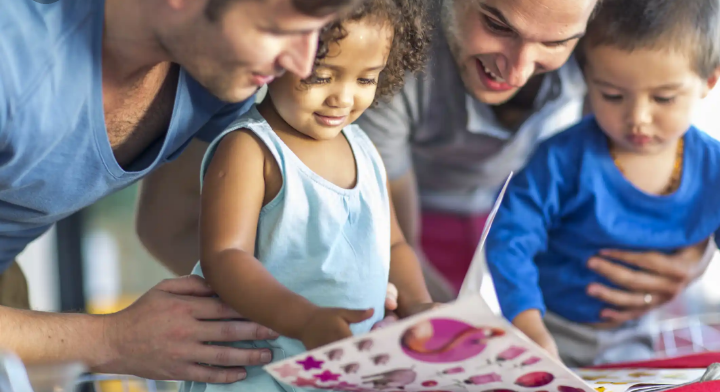10 Important Roles Of Children In The Family

Family is a union of people who are either related by blood, marriage, or adoption. From this definition, children can be related as a family by blood or adoption. Family is the first and the smallest unit of socialization. In the family, certain roles and obligations are bequeathed by norms, humanity, and culture to every member of the family.
These roles cannot perfect the family or be perfected while being performed in isolation. In other words, in Italy family, every family is required to play certain roles that are naturally morally, religiously, socially, or otherwise assigned. The role of children in the family is a very vital one which when the demand is not met, may and in most cases does affect the atmosphere and the expected homely nature of a family.
Family can either be nuclear or extended family. To whichever extent it is, the roles of children remain applicable, although some of the roles are more particular and direct with the nuclear family. Here are some of the roles of children in the family.
10 Important Roles Of Children In The Family
- Housekeeping
- Duty to Take Care of Siblings
- Duty to Protect and Uphold the Family Image
- Duty to live up to Expectations
- Parents’ Investment
- Bring happiness and love
- Promote a feeling of community and belonging.
- Help to create a positive and supportive environment.
- Help in the growth of compassion and empathy.
1. Housekeeping
Housekeeping generally is the chores of maintaining a house by performing tasks that contribute to the cleanliness and habitability of the house.
It is the direct responsibility of the children to foresee the cleanliness of the house. It is uncultured to have the father or the mother do the cleanings when there are children in the house. Of course, children handle chores according to their age and capability. There are certainly some kinds of heavy chores that kids are not expected to perform.
READ ALSO » 10 Important Tips To Be A Successful Affiliate Marketer
This very role of housekeeping has a positive contribution to the psychological and social adaptation of children as they keep growing in the existing world. They from the practice, learn maintenance and managerial skills. They also learn neatness which is a personal and social skill. Aside from the fact that this shapes them into humanity, housekeeping remains the role of children in the family.
2. Duty to Take Care of Siblings
Children have the responsibility of taking care of their siblings, especially the younger ones. This is the level at which children learn the act of humanity in their relations with other people in society, and of course, fosters love and peaceful coexistence amongst the family.
3. Duty to Protect and Uphold the Family Image
It is the role of the children to protect and uphold the image of the family. This is quite a sensitive role and most times it does not demand any positive or intentional performance. Ordinarily, every home desires a peaceful atmosphere and an honorable representation. No family enjoys being tagged or associated with negativity. When the parents must have set an operational standard for the family, it behooves the children to uphold and protect it.
Children are often advised to “think home” while making certain decisions or engaging in certain acts. The “think home” phrase there is simply suggesting that the image or reputation of the family should be considered by children in their every decision. Remember that in the introduction, we pointed out that the roles of family members in the family cannot perfect the family or be perfected in isolation.
Every member of the family is required to perform those roles that are culturally, socially, morally, religiously, or otherwise assigned to them. Therefore this duty to protect and uphold the family’s image is almost impossible to be performed by the parents in a situation where the children are carefree about it. And also, its non-performance renders the family manifestly imperfect.
4. Duty to live up to Expectations
This duty strikes with the duty to protect and uphold the family image because when children live up to expectations, they by so doing uphold the image of the family. Under this head, the children are expected to deliver. They are expected to grow in certain aspects of life.
Also under this head, children serve as a motivation for their parents’ hard work. Motivation is simply a drive that triggers and sustains one’s willingness to perform an act or function. It is an undisputable responsibility of the parents to care for the children. When there are children in the family, their presence or their anticipated existence adds some extra motivation to the economic consciousness of the parents. This role is better manifested when the children are
5. Parents’ Investment
READ ALSO » 9 Important Things You Should Always Include In A CV
Children are their parents’ investment. Investment involves spending money, time, and energy on something usually for future benefit. Yes, it is the role of the parents to make way for their children, lead them through, empower them, and invest in their careers and future.
On the other hand, it is the role of the children to become an investment unto their parents. Becoming an investment here suggests that they undertake to be beneficial, concomitant to the money expended on their development and future. Children are demanded to be productive, and as they become productive eventually, it is their role and responsibility to look after their parents later on and in old age. This role is a very important one. The
6. Bring happiness and love
Families with children are frequently filled with love and joy. They enhance life with awe and excitement and contribute to the creation of a cozy and loving household. By giving family members reasons to interact and spend time together, children also contribute to the strengthening of family relationships.
7. Promote a feeling of community and belonging.
Children are crucial in fostering the relationships that keep families together and give their members a feeling of community. Children contribute to the development of a pleasant and loving home where everyone feels supported and welcome by spending time together and engaging in family activities.
8. Help to create a positive and supportive environment.
Create a setting that is encouraging and positive. In their families, kids can do a lot to foster a supportive and upbeat atmosphere. Children may contribute to making their homes joyful and loving places by being nice and helpful to others and by expressing gratitude for the things they have.
9. Help in the growth of compassion and empathy.
Children naturally possess the capacity for compassion and empathy, and interactions with their family members can aid in the development of these traits. Children grow into kind and compassionate adults by learning to take care of others and comprehend their needs.
10. The Future caretaker
As parents age, children often assume the role of future caretakers. This role may include providing emotional support, financial assistance, or physical care when parents become elderly or face health challenges. The sense of responsibility towards aging parents is deeply ingrained in many cultures and serves as a way to ensure the family's well-being over time.
In conclusion, children fulfill diverse and crucial roles within the family unit. They act as bonding agents, sources of joy, heirs of family traditions, future caretakers, and catalysts for personal growth. Their presence and contributions are central to the well-being and cohesion of the family. As families evolve and adapt to changing circumstances, the roles of children remain fundamental to the strength and continuity of the family unit.
READ ALSO » Top 10 Important Tips To Become A Godly Man
